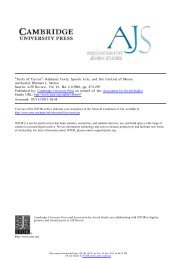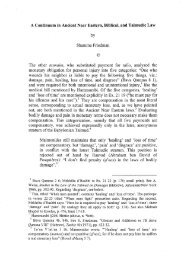Wimpfheimer_ Is it not so.pdf
Wimpfheimer_ Is it not so.pdf
Wimpfheimer_ Is it not so.pdf
Create successful ePaper yourself
Turn your PDF publications into a flip-book with our unique Google optimized e-Paper software.
54 ❙ Barry <strong>Wimpfheimer</strong><br />
Rava said: A teacher of children, (a gardener), a butcher, a cupper, and<br />
a town scribeÐall [if they lend <strong>so</strong>mething] while at work const<strong>it</strong>ute a<br />
loan in the owner's presence.<br />
Rava is <strong>not</strong> merely being coy or staging a scene. Desp<strong>it</strong>e his in<strong>it</strong>ial playfulness and<br />
the outburst yet to come, there is signi®cant substance in his remark. The terse form<br />
of his legal comment is standard for Talmud, as is the subtlety of his les<strong>so</strong>n.<br />
A number of innovations emerge from Rava's statement. According to<br />
tanna<strong>it</strong>ic law, ``owner presence'' occurs if the owner is hired e<strong>it</strong>her simultaneously<br />
w<strong>it</strong>h the animal or prior to <strong>it</strong>s hiring. Rava's groupÐthe teacher, butcher, and <strong>so</strong><br />
onÐstretches the law to include laborers who are in constant service.²¹ Their labor<br />
is <strong>not</strong> contracted discretely; <strong>it</strong> is under continuous contract. The most radical case of<br />
owner presence in tanna<strong>it</strong>ic <strong>so</strong>urces is one in which owner and animal are both hired<br />
for agricultural purposes but work in di²erent ®elds. Rava's group includes workers<br />
in di²erent industries altogether. Perhaps most signi®cantly, Rava's remark implicates<br />
an entirely new legal concept of employmentÐpublic service.²² For this<br />
group, no individual contract is necessary. The butcher need <strong>not</strong> be slaughtering my<br />
animal to be considered in my employ; slaughtering anyone's animal renders him or<br />
her in everyone's service.<br />
But Rava's employees are <strong>not</strong> entirely disadvantaged by his legal innovation<br />
and their status as public servants. Rava's statement lim<strong>it</strong>s the exoneration of the<br />
borrower to the time when these servants are actually serving.²³ Unlike tanna<strong>it</strong>ic<br />
law's discretely contracted owner, for whom the exoneration of the borrower knows<br />
no time lim<strong>it</strong>s,²⁴ the borrower from the public servant reverts to a pos<strong>it</strong>ion of<br />
liabil<strong>it</strong>y when the lender is <strong>not</strong> performing a service role. Whereas the contracted,<br />
discretely hired lender exonerates the borrower even at night, Rava's continuously<br />
employed public servants are only considered in service when they are at work. Rava<br />
nuances the law by treating a new category of employee to a new interpretation on<br />
the <strong>not</strong>ion of exonerationÐan interpretation that is at once more lax and more<br />
stringent. Rava's genius as a legal thinker is evidenced here in his abil<strong>it</strong>y to nuance<br />
the interstices of law, expanding the legal scope in moderation.<br />
The combination of Rava's account of intellectual gamesmanship and the<br />
aptness of his lecture elic<strong>it</strong>s a per<strong>so</strong>ni®cation of the lecture that is <strong>not</strong> at all

















